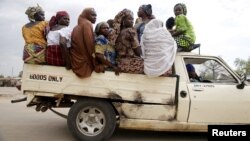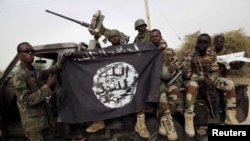Nigeria’s human rights commission said Friday it will probe a report that the Nigerian military has secretly run an abortion program that terminated thousands of pregnancies among women and girls who were rescued from Boko Haram militants. The report said most of the abortions involved tricking or forcing women to take pills or injections. The military has rejected the report, calling it untrue.
Officials of the United Nations, the Nigerian government and development partners met at the National Human Rights Commission headquarters in Abuja early Friday.
The meeting focused on Nigeria's human rights record and comes in the wake of fresh allegations against the Nigerian military revealed by a Reuters news agency investigation.
According to the Reuters report, which cited dozens of witnesses, Nigerian forces in the northeast region have been running a secret abortion program for women and girls who were detained and raped by Islamist militants.
The report said the military had performed at least 10,000 abortions since 2013.
The report said the abortions were done through pills or injections and were mostly performed without the women’s consent and often without their prior knowledge.
It said women were told the pills or injections were to restore their health and fight diseases such as malaria. In some instances, women who resisted were beaten, intimidated or drugged into compliance.
On Thursday Nigeria’s defense chief General Lucky Irabor refuted the report and said the military will not investigate it. He said the media should support narratives that boost public confidence in the military rather than tarnish it.
Anthony Ojukwu, the executive secretary of the national human rights commission, spoke to VOA after Friday’s meeting.
"When allegations like these are made, for us as a human rights commission, we always like to apply due process and that would mean we'll hear both sides of the story before we draw any conclusions,” Ojukwu said. “We will be calling on the relevant agencies to investigate this, so that we can be making the correct analysis of the situation.”
Minister of Women’s Affairs Dame Pauline Tallen also attended Friday's human rights dialogue with officials and said authorities are investigating the matter.
"We condemn any violation of human rights on anybody,” Tallen said. “It is condemnable and unacceptable. Investigation is going on and I hope it is not just true, what we're discussing here today is part of it."
The Nigerian military in recent years has been accused of human rights violations that include extrajudicial killings, unlawful arrests, detentions, torture and forced disappearances.
In December 2020, rights group Amnesty International said at least 10,000 civilians had died in Nigerian military custody since 2011.
In April of this year, the United States approved the sales of military equipment worth $1 billion to Nigeria after many months of delay due to human rights concerns.
Security analysts said the latest revelation, if true, could stall future deals between the Nigerian military and foreign counterparts.





